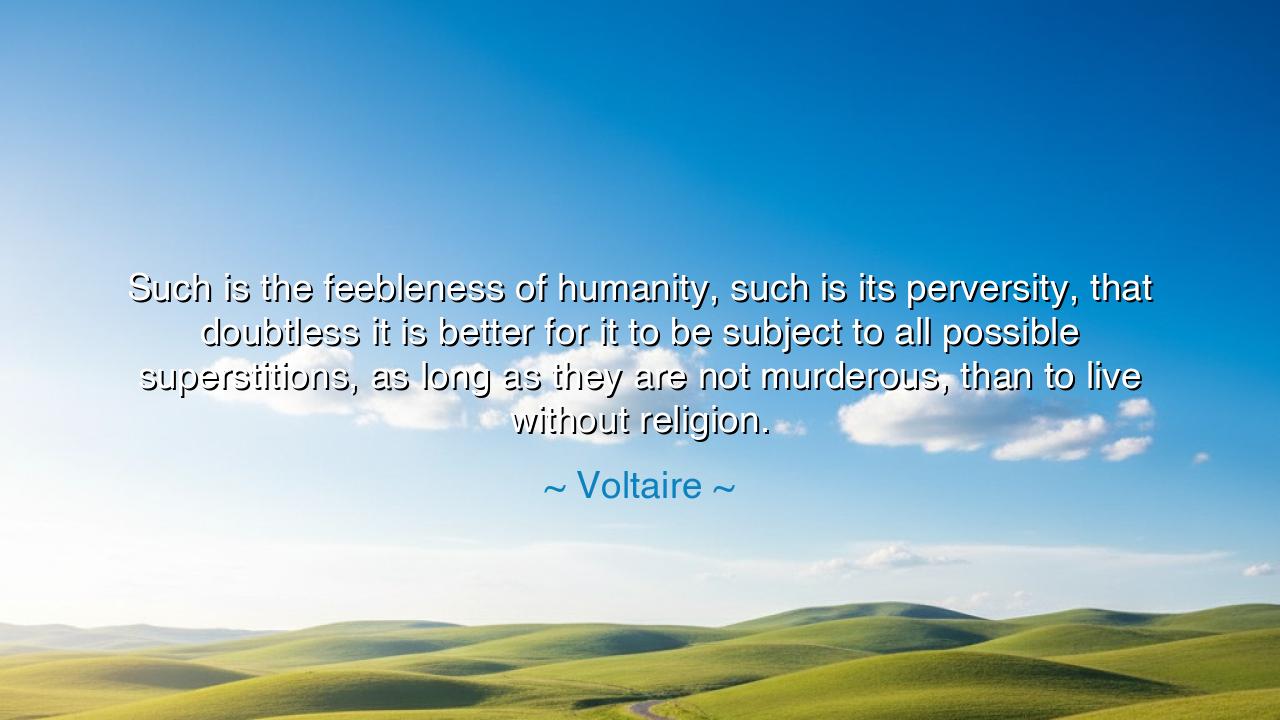
Such is the feebleness of humanity, such is its perversity, that
Such is the feebleness of humanity, such is its perversity, that doubtless it is better for it to be subject to all possible superstitions, as long as they are not murderous, than to live without religion.






"Such is the feebleness of humanity, such is its perversity, that doubtless it is better for it to be subject to all possible superstitions, as long as they are not murderous, than to live without religion." These thought-provoking words from Voltaire speak to the complexity of human nature and the essential role that belief—even in the form of superstition—plays in our lives. Voltaire, an outspoken critic of both religious and political institutions, here suggests that even flawed religions and superstitions, when they do not lead to violence or destruction, are better for humanity than living without any faith at all. He speaks to the feebleness of the human spirit, suggesting that without the comfort and moral guidance that religion provides, humanity would be lost, adrift in a sea of chaos and nihilism.
In the ancient world, philosophers such as Socrates and Plato similarly recognized the importance of faith in shaping the moral compass of society. Plato, in his work The Republic, believed that religion was essential in maintaining the order and virtue of the state. While he was deeply concerned with the moral consequences of belief, he still acknowledged that religion, even in its imperfect forms, could provide a structure that encouraged goodness and justice. In this sense, Plato understood that superstitions or beliefs in the divine could have a beneficial effect on human behavior, as long as they cultivated virtue rather than encouraging harm. Voltaire, though more critical of organized religion, echoes this sentiment by asserting that belief—however flawed—is preferable to living without any guiding moral framework.
Similarly, the Stoics like Epictetus and Marcus Aurelius understood that humans have an inherent need for meaning and guidance, and that philosophy, though a pursuit of wisdom, could not replace the deeply felt need for spiritual fulfillment. The Stoics argued that while reason should guide human behavior, it was the belief in higher principles, be they natural law, virtue, or divine order, that kept society from descending into chaos. They saw the gods and faith as important metaphors for order in the universe, acknowledging that even imperfect belief systems could provide solace and direction for those who struggled with life’s inherent difficulties. Voltaire, too, contemplates the human need for meaning, albeit through the lens of reason and toleration, and suggests that the structure religion provides is better than a life devoid of such guiding forces.
Consider the life of Martin Luther, whose actions in the early 16th century led to the Protestant Reformation and a split in Christianity. Luther was an outspoken critic of the Catholic Church and its practices, yet his challenge to the Church was not a rejection of faith but a call for a more personal, direct relationship with God. Luther believed that religion, in its truest form, should empower individuals and lead them to spiritual fulfillment. His rebellion against the institutional church did not, however, lead him to reject religion altogether; rather, he saw the reformation as a necessary correction to an institution that had become too corrupt. Luther’s story teaches us that even in the face of imperfection, faith can provide redemption and guide individuals toward a moral life, much like the superstitions Voltaire mentions, which might be flawed yet still offer some form of moral structure.
In contrast, consider the rise of nihilism in the 19th and 20th centuries, especially in the works of Friedrich Nietzsche. Nietzsche famously declared that “God is dead,” suggesting that without religion, humanity was facing a world devoid of meaning or moral order. Nietzsche believed that without faith or some higher purpose, humans would descend into despair, as they would be left to navigate an amoral universe. While Nietzsche called for a new type of individualism, his rejection of traditional religion left many feeling unmoored, much like the empty space Voltaire feared. The rise of existential doubt and nihilism in modern thought illustrates the danger of living without some form of belief—be it religious or philosophical—because without it, people are left to face the world alone, with no guiding principles to navigate the challenges of life.
Voltaire’s message resonates even today, in an era of increasing secularism and individualism. Religion, even in its most flawed forms, provides structure and meaning that help individuals confront the inherent suffering and uncertainty of life. Faith, even when misunderstood or misguided, offers a way for people to cope with distress, loss, and uncertainty. However, Voltaire also suggests that while religion may provide a framework, it must never be allowed to become murderous or destructive—a lesson that echoes in the philosophies of the ancients, as they warned against the misuse of religious power.
The lesson from Voltaire’s quote is one of balance and tolerance. We must recognize the value of belief and faith, even if it comes in imperfect forms. Rather than rejecting religion outright, we should see the benefit it can bring to individuals and societies in providing moral structure and a sense of meaning. Faith can be a powerful force for good, as long as it is practiced with wisdom, compassion, and tolerance. In our own lives, we can find ways to honor the beliefs of others, even as we pursue our own spiritual journeys. By doing so, we create a world that is not only respectful of religion, but one that values the freedom to seek meaning in our own ways, without resorting to violence or intolerance.






AAdministratorAdministrator
Welcome, honored guests. Please leave a comment, we will respond soon